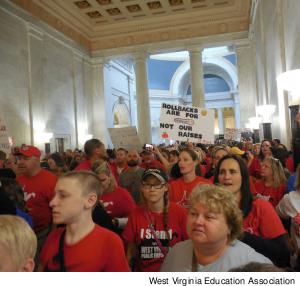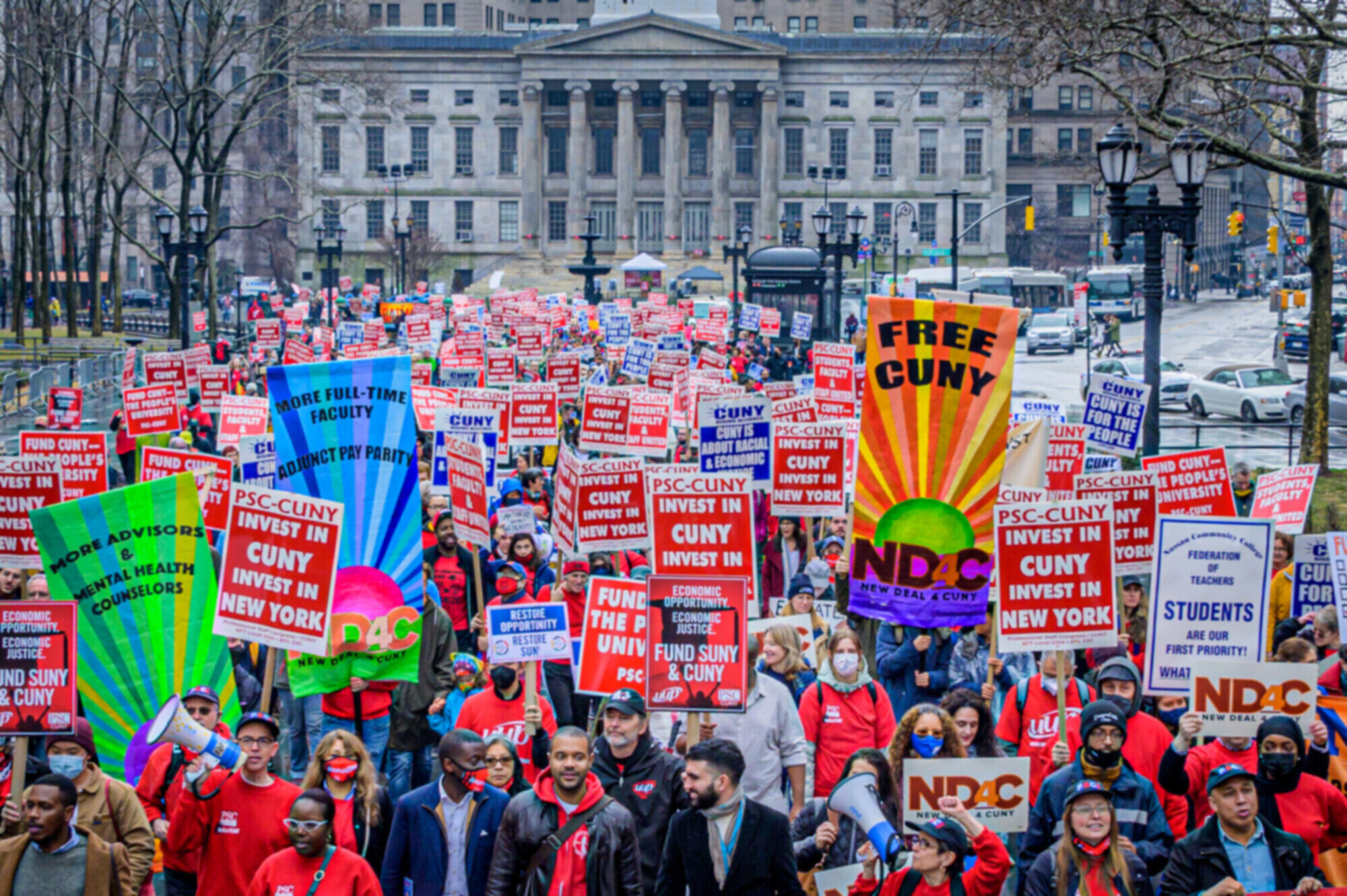Translating West Virginia for PSC and CUNY
The West Virginia teachers have offered an inspiring model of common-good unionism, internal solidarity and perseverance. But as Sharon Persinger’s March Clarion column notes, their circumstances are not the PSC’s.
 |
I’d put the point more strongly than Persinger did: the circumstances that made it so feasible for West Virginia teachers to strike are the very circumstances that make their situation different from ours. West Virginia teachers have local relationships that reach throughout their state; as a New York City-centered union, our members and our work are concentrated in a small area. When West Virginia teachers withheld their labor, families in every town and county in the state were affected; because we teach adults rather than children, if we withheld our labor the immediate impact on New York City would be modest – and on the rest of the state, negligible.
Not least, school superintendents supported the West Virginia strike by closing schools, protecting strikers from possible legal penalties. It’s hard to imagine CUNY management extending even tacit support to any PSC strike. What’s more, the PSC has resources that the West Virginia teachers lack: a network of political and community allies, a higher membership density and the stable organization encouraged by more favorable state labor laws and by a decades-long record of collective bargaining.
What would it look like for the PSC to learn from the West Virginia teachers’ courage in our own way, given our own circumstances and resources? I’d suggest that it would mean focusing on three things: fostering community support through alliances like CUNY Rising and the Working Families Party, making sure that the demands we fight hardest for are the demands that best unify our members and allies, and patiently building relationships and power in our own localities – our campus chapters.
Geoffrey Kurtz
Borough of Manhattan
Community College
‘No’ to the CIA at CUNY
On April 24, the PSC chapter of Baruch College hosted anthropologist David Price to discuss the decision by the Baruch College administration to sign a memorandum of understanding (MoU) with the Central Intelligence Agency to initiate a Signature School Program on campus. This would entail on-campus interviews, workshops and networking activities with student organizations, honor societies and “diversity” professional organizations, notably those with particular language abilities.
Price noted worrisome facts such as how the CIA facilitates presentations and seminars aligned with university course content, using CIA agents as “campus ambassadors.” Students may get financial aid (tuition, funds for books, a monthly stipend, travel expenses) for participating and are then required to serve at the CIA for the same length of time as they received their subsidy. But the CIA expects a “return on investment” on its career placement. Should the student fail to sign up with the CIA, she or he must repay the subsidy at market interest rates.
Apart from the fact that this secret agreement avoided faculty governance requirements, Price pointed out other possibly undesirable effects of having the CIA embedded at Baruch College. It can lead to classroom surveillance of faculty and students, it can import group-think to the goals of research, it can negatively affect faculty research abroad, given the notorious reputation of the CIA.
Price also pointed to covert CIA Cold War missions like the coups in Iran in 1953, Guatemala in 1954 and Chile in 1973, and many more. In the 2000s, the agency was known for assassinations and torture in places of “extraordinary rendition.”
The teach-in was an opening gambit in an ongoing effort by faculty and staff to repeal this undemocratic decision to welcome morally reprehensible actors onto campus. Concerned faculty at Baruch are now circulating a petition to oppose the Signature School, as well as working with activists in the PSC’s International Committee and beyond to create a larger network dedicated to keeping CUNY campuses free from clandestine organizations aimed at recruiting students to further proliferate geopolitical conflict and global war.
Renate Bridenthal Brooklyn College, retired
Stuart Davis, Baruch College
Preserving governance
The reports on governance struggles at the School of Professional Studies (SPS) and Guttman are no surprise (“Protecting faculty governance,” March 2018 issue of Clarion). When CUNY first proposed SPS, it had a limited remit – summer programs to retrain teachers in the new math and similar subjects which the University Faculty Senate (UFS) supported. I suppose we should have known that an administrative crawl could not be contained.
CUNY defended its latest effort to undermine quality education in its historic senior colleges as a tool to serve older students whose various life and work obligations prevented them from attending the older, more expensive colleges. At Guttman, the administration argued that community college students would prosper under a nontraditional, “interdisciplinary” and hands-on curriculum. The new community college initially ignored departments, and brought in mostly untenured junior faculty.
The charter of the UFS, a document established by the bylaws, charges it with oversight of programs that cross campuses. This was ignored by CUNY Central in a manner presaging the way it ignored the UFS during the agonizing birth of Pathways.
Since the mid-1990s, CUNY Central has acted as the prime mover of what they call academic and professional innovation. Based on the Schmidt report – a result of the Pataki-Giuliani-led board – it was decided that the university needed to behave as a unit, a decision which undermined and ignored the historic uniqueness and culture of the colleges.
The result, in my view – after 55 years of college teaching, largely in CUNY – has done little beyond demoralizing a significant portion of faculty and simultaneously undermining liberal arts education – at the very moment when this country cries out for a more informed public.
A university with a large international student body along with an often poorly prepared local population surely ought to expect that its graduates have some clue about the history and culture of the nation and the world they will inhabit.
Sandi Cooper
College of Staten Island and the Graduate Center, retired
Cops vs. protesters
Our members are disproportionately represented at various political events and, like other attendees, often “penned in” by the NYPD’s unnecessarily tight control imposed on the participants. There’s a connection between the progressive nature of much adversarial New York City politics and the police practices that make it increasingly difficult to participate in some events.
On March 24 I planned to attend the March for Our Lives rally kicking off on Central Park West between 72nd and 79th Street. I had intended to join PSC members on 74th Street and Central Park West at 11 am. As it turned out, police were allowing participants to join the march only on 76th Street, nowhere else between 72nd and 79th Streets.
Since people were allowed to enter only on 76th Street, the mass of people entering at that spot was huge. To make matters worse, part of the street on the south side of 76th Street was blocked by metal barriers, permitting a very narrow stream of people to join the march at any one time. Furthermore, barriers were placed at each intersection jutting out into Central Park West, fencing marchers in, preventing them from moving north or south within the ranks of the marchers.
After an hour, unable to move south of 76th Street, I abandoned the possibility of joining my colleagues a mere two blocks south and went home. I understand the need to block some streets in the vicinity of a march or demonstration: after all, others have the right to drive or otherwise navigate the neighborhood. However, the practice of using metal barriers to the extent that it’s difficult to join others or otherwise move around within a mass of people lawfully expressing a political opinion is unacceptable. I was far from the only person unable to join others at this important event.
The increased use of these portable metal barriers through the years makes it difficult to participate comfortably in demonstrations permitted by the city. It’s hard not to believe that there’s an attempt to make this form of political activism difficult for those who wish to participate. There’s no reason the police can’t maintain order and allow the routine life of the city to continue without erecting literal barriers to participation in democratic acts.
Elliot Podwill
BMCC, retired
Editor’s note: Clarion reserves the right to edit all letters submitted for publication.

